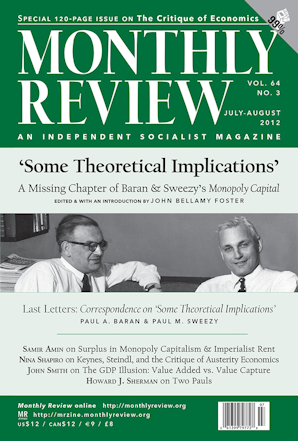Also in this issue
- Introduction to Special Issue on the Critique of Economics
- A Missing Chapter of Monopoly Capital: Introduction to Baran and Sweezy's 'Some Theoretical Implications'
- Some Theoretical Implications
- Last Letters: Correspondence on "Some Theoretical Implications"
- The Surplus in Monopoly Capitalism and the Imperialist Rent
- The GDP Illusion: Value Added versus Value Capture
- Keynes, Steindl, and the Critique of Austerity Economics

